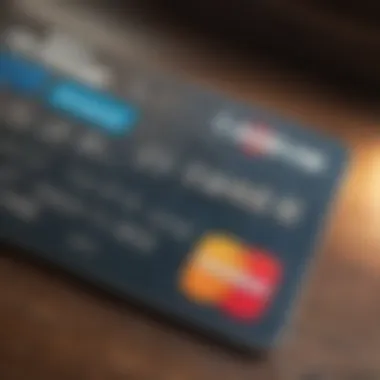How to Check Your Capital One Secured Credit Card Status


Intro
Whether you're a novice trying to navigate the world of credit or someone looking to refine your financial approach, understanding the status of your application can illuminate several key aspects. It provides a glimpse into your creditworthiness, helping you make informed decisions as your financial journey progresses.
Investment Dictionary
Definition of Key Terms
Understanding the terminology surrounding secured credit cards is vital for applicants. Here are a few key terms that will serve as your stepping stones:
- Secured Credit Card: This is a type of credit card that is backed by a cash deposit you make upfront. Your credit limit typically equals this deposit.
- Creditworthiness: A measure of your ability to repay debt, often assessed through your credit score and credit history.
- Application Status: The current state of your application, including whether it’s pending, approved, or declined.
Breakdown of Terminology Usage
Knowing when to use specific terms can help you communicate more effectively. For instance, when checking the status of your application online, you’ll often encounter phrases like "pending review" or "approved." These terms indicate where you stand in the process. Additionally, familiarizing yourself with financial jargon can enhance your understanding of credit reports and lending criteria.
Monitoring Your Application Status
Keeping an eye on your application status is a crucial step. Here’s how you can do it:
- Online Account: If you’ve created a Capital One account, logging in allows you to view your application status in real-time.
- Automated Phone Service: You can call Capital One’s automated line to check your application status.
- Email Notifications: Look out for emails from Capital One. They may send updates regarding your application.
"Understanding the status of your credit card application is not just about knowing where you stand, it can also shape your financial future."
Implications of Securing a Credit Card
Securing a credit card like those offered by Capital One not only paves the way for building credit but also brings with it important responsibilities. Here are some vital points to consider:
- Building Credit History: Making timely payments can enhance your credit score, laying a solid foundation for future borrowing.
- Financial Health: A secured credit card often helps manage spending habits, providing a safety net.
- Interest Rates: Be mindful of the interest rates associated with secured cards; they can affect overall borrowing costs.
The journey of monitoring your Capital One secured credit card application can feel overwhelming at times. However, with the right understanding and resources, it becomes manageable. As you embark on this financial path, keep close tabs on your application status, and remain aware of the impact your financial choices carry.
Understanding Secured Credit Cards
In the landscape of personal finance, secured credit cards stand out as a bridge to better credit management for individuals looking to establish or rebuild their credit scores. Understanding the essence of these financial instruments is crucial, especially for those navigating their fiscal journey. Often viewed as a stepping stone for financial independence, these cards carry specific features that cater to those who might have limited credit history or past credit challenges.
The importance of secured credit cards cannot be overstated. For many, it’s the first taste of what it means to borrow money responsibly, and it offers a platform to learn about credit utilization and management.
By putting down a cash deposit—typically equal to the credit limit—users minimize risk for the lender while gaining the chance to engage with the credit reporting system. This direct link between responsible usage and improved credit scores highlights the card’s dual purpose: protection for the lender and opportunity for the user.
What is a Secured Credit Card?
A secured credit card is essentially a type of credit card backed by a cash deposit. This deposit serves as collateral, which the card issuer may keep if the cardholder defaults on their payments. For example, if you put down a $500 deposit, you might be granted a credit limit of $500. This design aims to reduce the risk for the lender while providing a pathway for individuals to start building or reestablishing their credit histories.
It does not differ much from a traditional credit card in terms of usage. Cardholders can make purchases up to their credit limit, pay off their balance monthly, and even earn potential rewards. However, the affordability of these cards often makes them appealing for new credit users.
How a Secured Credit Card Differs from Traditional Cards


While secured credit cards and traditional credit cards appear similar on the surface, their fundamental differences are noteworthy.
- Collateral and Risk Mitigation: The most obvious distinction is that a secured card requires a cash deposit, whereas traditional credit cards typically do not. This provides the bank or credit union with a safety net against defaults.
- Target Audience: Secured cards primarily cater to individuals with no credit history or past credit issues, whereas traditional cards usually serve consumers with a more established credit profile.
- Approval Process: Gaining approval for a secured credit card is generally easier than for unsecured options. The lower risk for the issuer often translates into less stringent credit requirements.
- Impact on Credit: Both card types report activity to credit bureaus, yet secured cards offer a unique chance to show responsible borrowing behavior, which can be crucial for credit building in the long term.
Understanding both what a secured credit card is, and how it differs from traditional counterparts, helps demystify the process of credit building. For many, these cards are not just a credit tool; they are a lifeline to better financial health and stability.
The Application Process
When embarking on the journey of obtaining a Capital One secured credit card, understanding the application process is paramount. This process is not merely a series of steps; it lays the foundation for your financial future. A secured credit card can serve as a powerful tool for building or rebuilding your credit profile, but only if you navigate the application path correctly. Each facet of this process, from preparation to submission, can shape your credit standing and set the stage for responsible usage.
Step-by-Step Application Guide
Applying for a secured credit card can feel like a daunting task, but breaking it down into manageable segments makes it much more approachable. Here's a detailed guide to steer you through each step:
- Gather Necessary Documentation: Before even thinking about applying, have your personal information sorted. This typically includes your name, address, Social Security number, and income details.
- Visit the Capital One Website: Head to the official Capital One site to find the secured card application page. Here, you can also glean information about benefits and terms.
- Fill Out the Application Form: You’ll be prompted to enter your personal and financial information. Take care to double-check your entries for accuracy. Errors here can delay your application.
- Submit Your Initial Deposit: Unlike regular credit cards, a secured card requires an upfront deposit that typically acts as your credit limit. Ensure you have the necessary funds available.
- Review and Submit: Once everything is filled out, take a moment to review your application. If everything checks out, hit the submit button.
Following these steps carefully can mean the difference between approval and rejection.
Requirements for Approval
Understanding the criteria that Capital One uses to approve secured credit card applications gives you a strategic edge. Here are the fundamental requirements:
- Age: You must be at least 18 years old to apply.
- Residency: Applicants usually need to be U.S. citizens or residents.
- Income: Valid proof of income is crucial, even if you're receiving benefits. This demonstrates your ability to make monthly payments.
- Credit History: Even if you have a poor or limited credit history, a secured card is designed for individuals in this situation. However, prior bankruptcies may be taken into account.
- Deposit Amount: An initial deposit is necessary, generally ranging from $49 to $200, which will determine your initial credit limit.
Meeting these requirements is essential for moving forward in the application process.
Common Pitfalls in the Application Process
Despite good intentions, applicants sometimes trip up along the way. Here’s a rundown of the common pitfalls to avoid when applying for a secured credit card:
- Incomplete Applications: Leaving fields blank or misrepresenting info can lead to automatic disqualification.
- Misunderstanding the Terms: Not reading the fine print can result in unwelcome surprises such as high fees or special conditions attached to your card.
- Forgetting Financial Documentation: Having your financial documents ready often gets overlooked, but it’s critical for demonstrating your ability to repay.
- Rushing the Process: Many applicants fall into the trap of hurrying through. Taking your time ensures you don’t miss any crucial detail.
- Ignoring Impact on Credit Score: While checking your application status won’t hurt your score, not understanding how a secured card works can lead to poor credit management down the line.
Avoiding these pitfalls will keep you on a steady course toward securing your Capital One secured credit card.
Checking the Status of Your Application
Staying informed about the status of your Capital One secured credit card application is crucial. Knowing where you stand helps you manage your finances more effectively. Whether you’re anxiously waiting for approval or bracing yourself for possible roadblocks, being in the know can ease some of that uncertainty. This section delves into various methods of checking your application status, helping you to understand what your application’s status means for your credit journey.
Online Methods to Check Application Status
In today’s digital age, doing things online is often the easy route. Capital One equips its customers with an online portal that allows you to check the status of your credit card application at any time. You simply need your application reference number and some personal information to log in. Here’s how it works:
- Visit the Capital One Website: Navigate to the official Capital One website and find the section related to application status.
- Enter Your Information: Input your application reference number, last name, and the last four digits of your Social Security Number. This info is used to verify your identity.
- Check Status: The portal will display your application status. Maybe you’ll see something like "Pending", which suggests a decision hasn’t been made yet, or you might find "Approved" or "Denied". Each outcome opens a different set of paths to consider as you move forward with your financial goals.
Checking your application status online saves time and keeps you in charge.
Phone Inquiry Procedures
If you’re not a fan of the web or simply want to get direct answers, reaching out to Capital One via phone is another option. Here’s a streamlined approach for this method:


- Find the Right Number: Look for the customer service number related to your application status. This is often prominently displayed on their official site or any correspondence you’ve received.
- Prepare Your Details: Have your application details at hand, such as your name, date of birth, and Social Security Number. This will make the process smoother and avoid delays.
- Speak to a Representative: Explain that you’re inquiring about your application status. The representative should be able to access your details and provide updates on your application.
While phone calls might seem a bit old-fashioned, they can offer a personal touch that you might find helpful during a confusing time.
Understanding the Notification Process
Once you’ve sent in your application, it’s important to know how and when you will be notified about the decision. Awareness of the notification process is key:
- Notification Methods: Typically, Capital One will inform you via email or regular mail. Most folks appreciate the email route as it allows for quicker communication.
- Expected Timelines: Some decisions get made within days, while others may drag on for weeks. Being patient is essential, but knowing what’s reasonable can help you manage your expectations.
- What to Look For: If you receive an approval notification, there will usually be instructions on next steps. If you’re denied, you might get information about what went wrong, which can be pivotal for future applications.
Understanding the ins and outs of each method ensures you stay ahead of any financial implications. By utilizing these avenues efficiently, you can transition from inquiry to action in your credit journey.
Interpreting Your Application Status
When you submit an application for a Capital One secured credit card, the awaiting period can feel like an eternity. Understanding how to interpret the status of that application is crucial. It not only gives you peace of mind but also provides insight into your financial standing. Analyzing the feedback you receive can help you strategize your next steps effectively, whether you’re on the path to approval or facing rejection.
Keeping an eye on your application status serves as a vital checkpoint in your journey towards building a stronger credit profile. This way, you can better prepare yourself for what comes next, all while staying informed about your credit health.
Conditional Approvals Explained
Conditional approvals can be a bit of a mixed bag. Essentially, this means that while your application has made it partway through the process, there are certain conditions you need to meet before the card is fully issued. It’s not as straightforward as a simple ‘yes’ or ‘no.’ You might be asked for additional documentation, such as proof of income or identification verification.
For instance, if you’re asked to provide a recent pay stub, it’s a good idea to get that together as quickly as possible. Acting promptly can actually speed up your final approval. Generally, conditional approvals indicate that the lender sees potential in your application, but needs a bit more assurance before moving forward.
"A conditional approval is like a question mark in your mind; it signifies potential but requires some more effort to clarify."
What a Rejection Implies
Receiving a rejection, while disappointing, doesn’t necessarily spell doom for your credit journey. A rejection typically means that the credit underwriters found your application lacking in some aspects. This could stem from various factors, including a low credit score, insufficient income, or previous delinquencies.
Understanding the specific reasons behind the rejection is essential. Capital One, like other lenders, usually provides an adverse action notice that outlines the primary reasons. With this information in hand, you can address the areas that might need your attention. For example, if your credit history is the sticking point, you might focus on paying down existing debts or making timely payments on your current obligations.
It’s important to remember that a rejection can be a learning opportunity. Don't take it lying down; instead, take proactive steps towards improving your situation.
Next Steps Following Approval
If you find yourself on the sunny side of the street with an approval, congratulations! But don’t let all the excitement distract you from what’s next. First things first, you’ll be required to make a security deposit. This amount, which acts as collateral, dictates your credit limit. Ensure that you’re fully aware of the deposit requirement to avoid any surprises.
Once you’ve secured your card, follow these guidelines to maximize its potential:
- Timely Payments: Always pay your credit card bill on time. Late payments can severely affect your credit score.
- Keep Balances Low: Aim to use less than 30% of your available credit. This is a signal to creditors that you’re handling your credit responsibly.
- Monitor Your Credit: Use tools to keep an eye on your credit score and report. This helps in staying informed and catching any errors early.
Navigating the world of credit cards can be tricky, so being well-equipped with these steps will better position you to make the most out of your newly acquired Capital One secured credit card.
As you journey through your financial landscape, remember that every step taken now contributes to your future financial health.
The Role of a Secured Credit Card in Building Credit


Secured credit cards are pivotal in the journey of building a solid credit profile. Unlike traditional credit cards, these cards require a cash deposit that acts as collateral. For those with limited or tarnished credit history, this type of credit card becomes a stepping stone to improve creditworthiness. But what exactly makes secured credit cards such valuable tools?
First and foremost, the regular, on-time payments made using a secured card are reported to credit bureaus. This reporting helps you establish a credit history. Think of it like laying down bricks to build a sturdy wall. Each timely payment adds another brick, and over time, it results in a solid credit score. For individuals looking to enhance their credit standing or rebuild after setbacks, this can’t be overstated.
The implications of responsibly using a secured credit card extend beyond just managing debt. They also offer insightful lessons in financial discipline. Mastering the art of budgeting and maintaining a low credit utilization ratio are among the skills cultivated through the use of these cards. Plus, they instill the understanding of credit mechanics, a crucial factor in achieving long-term financial health.
How Secured Cards Impact Your Credit Score
Secured credit cards affect your credit score similarly to regular credit cards. The FICO scoring system, commonly used by lenders, takes several factors into account, including:
- Payment History: This is the most influential factor, comprising about 35% of your score. With a secured card, making payments on time directly benefits this component.
- Credit Utilization Ratio: Ideally, you should keep this ratio below 30%. If your secured card has a $500 limit, for instance, keeping your balance under $150 can positively influence your score.
- Length of Credit History: Over time, having a secured card contributes to the age of your credit accounts, which also plays a role in your overall score.
However, it’s crucial to remember that negative behaviors, such as late payments or maxing out your card, can set you back as swiftly as positive actions can move you forward. In the world of credit, it’s a constant balancing act.
Strategies for Effective Credit Building
Building credit effectively using a secured credit card requires more than just regular payments. Here are some strategies to enhance your credit-building journey:
- Monitor Your Credit Report: Regularly check your reports to catch any discrepancies early. You’re entitled to a free report annually from each of the three major bureaus.
- Limit Applications: When you apply for new credit frequently, it can raise red flags. Each new inquiry can slightly lower your score, so be selective and strategic.
- Increase Your Deposit: As you become more comfortable managing your secured card, consider increasing your deposit or requesting a higher credit limit. This can further improve your utilization ratio.
- Gradually Transition to Unsecured Cards: After a year or so of responsible use, look into applying for unsecured credit cards. It’s an excellent next step to continue elevating your credit profile without the collateral requirement.
Utilizing a secured credit card can be a powerful method for building credit when approached with care and dedication.
"Your credit is like a reputation; it takes years to build and moments to ruin."
By following the above strategies, you can turn your secured credit card into a launchpad for solid financial health. Stay vigilant, make informed decisions, and you’ll be on the right path to a brighter credit future.
Frequently Asked Questions
When diving into the world of secured credit cards, specifically with Capital One, potential applicants are bound to have many questions. This section aims to clarify some of the most common inquiries surrounding the application process and the implications of a secured credit card. Understanding these questions helps demystify procedures and sets realistic expectations, contributing to a smoother financial journey.
How long does it take to process my application?
The processing time for your Capital One secured credit card application can vary based on several factors. Generally, applicants can expect a response within a few days to one week after submission. Factors influencing this duration include the volume of applications received, the completeness of your provided information, and your overall credit profile.
If you’ve submitted all necessary documentation and your credit report isn't too complex, you’ll likely receive a decision rather promptly. However, during peak times, like seasonal promotions, it might take longer.
If you haven’t heard back in a week, it’s often wise to check your application status either online or by contacting customer service. Being proactive can ease anxiety and keep your credit-building efforts on the right track.
Can expedite my application process?
Expediting the application process for a Capital One secured credit card is not typically an option provided to applicants. Once your application is in the system, it usually follows a standard timeline. However, there are a few strategies you can consider to potentially speed up things:
- Complete Application: Make sure your application is filled out fully and accurately. Missing or incorrect information can lead to delays.
- Contact Customer Service: If you feel your application has been pending too long, reach out to Capital One. A representative may provide insights into the current status or expedite review under specific circumstances, though success isn’t guaranteed.
In seeking to expedite your application, it’s crucial to maintain realistic expectations. Sometimes, patience is key as these processes can take their natural course.
What if am denied? Can reapply?
Facing a denial for your Capital One secured credit card application can be disappointing. However, it’s important to understand that this might not be the end of your credit-building journey. Here’s what you need to consider if you find yourself in this situation:
- Understand the Reasons for Denial: Read the communication from Capital One carefully. They often provide insights into why the application was declined, such as credit history issues or insufficient income.
- Check Your Credit Report: Before reapplying, request a copy of your credit report. You want to ensure there are no errors affecting your score. If you find mistakes, correcting them can improve your chances.
- Timeframe to Reapply: It’s generally advisable to wait at least six months before reapplying. This waiting period allows time for improving your credit score or rectifying any issues identified in the denial.
- Consider Alternatives: Exploring other secured credit card options or credit-builder loans might also be worthwhile if reapplying isn’t appealing.
Ultimately, a denial isn’t the end; instead, it can serve as a learning opportunity. Evaluating your financial situation and preparing adequately can enhance your chances of success if you decide to apply again.
"The world of credit can be tricky, but persistence and knowledge are your best allies."
By addressing these frequently asked questions, you're better equipped to navigate the complexities of securing a Capital One secured credit card and reaping the benefits of responsible credit use.



